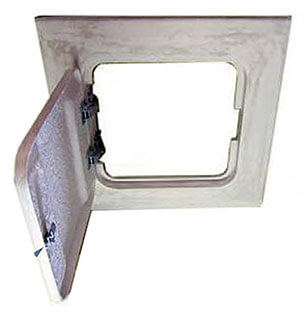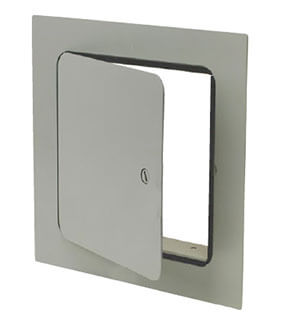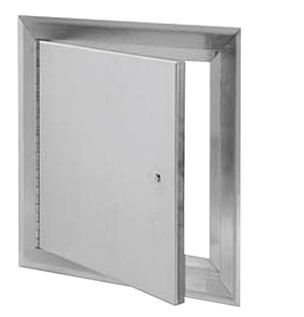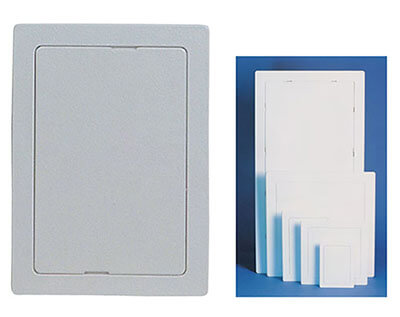
Access panels are needed throughout buildings to protect a variety of structures, from plumbing to electrical systems, while still providing access to them when the need arises. Since access panels exist to protect an area, all good access panel doors are composed of sturdy, heavy-duty materials. But what does this mean? Even at the highest level of quality, not all access panel doors are composed of the same materials.
Although all access panel materials can be used to protect electrical systems, plumbing, security systems, telephone systems, computer wiring, or even a television, this doesn’t mean that you should assume that any material will work for your needs. There are plenty of access door material options to choose from, so be sure you understand which material is best for your application.

Composed of a combination of minerals and high-strength glass, gypsum access panels manage to be extremely lightweight and strong at the same time. High quality gypsum access panels are completely resistant to mold and fungus growth.
Due to the fact that it is so lightweight, gypsum is an outstanding material for installing concealed service panels, especially in extremely thin walls. Also, for those who want to be environmentally friendly, there are gypsum access panels that are composed mostly of recycled materials.
For an example, check out the WB GY 3100 Series Lightweight Gypsum Hinged Ceiling Access Panel.

Steel is by far the most commonly used material for access panels. It’s a very popular choice for access panels because of its strength and extreme temperature resistance (melting point of 2750 degrees fahrenheit). Steel can be treated differently to become galvanized steel or stainless steel for maximum resistance to corrosion.
Galvanized and stainless steel access panels are extremely useful in areas where an access panel will be susceptible to high heat conditions, fire, or high-impact situations. Steel is a diverse material capable of use for access panels in any situation. For aesthetic purposes, a steel access door fits in perfectly with many area designs that feature rustic, industrial, or modern styles.
For an example, check out the WB GP 100 Series Premium Access Door.

Capable of being thin, lightweight and strong, aluminum is an extremely versatile access panel material. It is even more corrosion-resistant than steel. Because of its extreme resistance to corrosion, aluminum access panels are outstanding for outdoor use or in indoor areas where a great deal of moisture is present.
Its corrosion resistance, combined with its high level of heat resistance (melting point of 1121 degrees Fahrenheit), makes aluminum an excellent material for areas that are subject to high heat conditions and extreme levels of moisture or humidity. Perhaps the best quality of aluminum is its lightweight properties for easy handling and installation.
For an example, check out the WB AL 1500 Series Insulated Aluminum Access Door.

Plastic is a very diverse material that combines strength and simplicity. Plastic access panels are installed using an adhesive caulking to reinforce their position. Higher quality plastic access panels are made with UV stabilizers to make them highly resistant to sunlight. Also, plastic is a relatively inexpensive material, so these types of access panels tend to have the lowest cost.
Plastic access doors are resistant to fading and corrosion, making them great for areas that are highly susceptible to moisture. Plastic is a lightweight material option for installing access doors into all types of ceilings and walls. They can also be tileable for better integration into the design of a finished wall.
For an example, check out the WB MAP 1800 Plastic Reversible Access Door.
Fortunately, there is a wide variety of access panel material options and uses. Each type has specific benefits in certain applications. Steel may be the most common material; however aluminum, plastic, or gypsum may be more suited to your unique needs. Don’t forget there are plenty of custom finishing options for access doors too!
If you have any questions about access door materials, or you would like assistance in selecting the right material for your needs, contact the experts at Williams Brothers today.